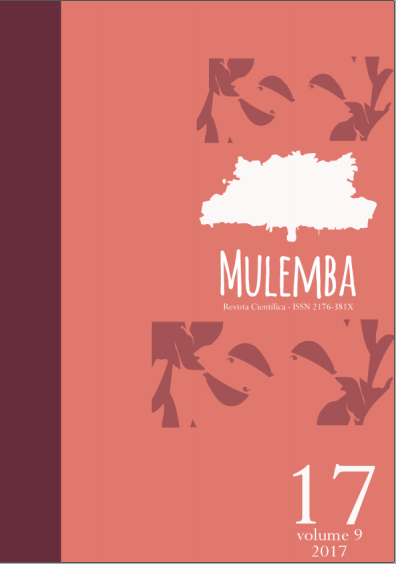Virgem Margarida: de lo Sublime a lo Trágico
DOI:
https://doi.org/10.35520/mulemba.2017.v9n17a14603Palabras clave:
historia mozambiqueña, razón, mujeres, binarismos.Resumen
La propuesta de este artículo es interdisciplinaria por agregar recortes conceptuales que se referen a los binarismos antropológicos, a la construcción de la trama narrativa y a la historia del pueblo africano, en el análisis de la película Virgem Margarida, de Licínio Azevedo. Se trata del drama sobre un contingente de mujeres aprisionadas por un grupo de gobernantes y sus aliados, cuyo proyecto de nación viene pautado por una concepción de razón que se superpone a los mitos y a las creencias populares mozambiqueñas. Además de narrar un hecho muy próximo de lo ocurrido en el proceso de independencia de Mozambique, la película se centra principalmente en el sufrimiento humano, la connivencia y el odio que saltan de lo sublime a lo trágico, desde lo cómico a lo excelso entre las mujeres y sus verdugos durante el confnamiento en grupo.Descargas
Descargas
Publicado
Número
Sección
Licencia
Los autores que publican en esta revista concuerdan con los siguientes términos:
- Los autores mantienen los derechos autorales y conceden a la revista el derecho de primera publicación, con el trabajo simultáneamente licenciado bajo la Licencia Creative Commons Attribution que permite compartir el trabajo con reconocimiento de la autoría y publicación inicial en esta revista.
- Los autores tienen autorización para asumir contratos adicionales separadamente, para distribución no exclusiva de la versión del trabajo publicada en esta revista (ej.: publicar en repositorio institucional o como capítulo de libro), con reconocimiento de autoría y publicación inicial en esta revista.
- Los autores tienen permiso y son estimulados a publicar y distribuir su trabajo online (ej.: en repositorios institucionales o en su página personal) en cualquier momento antes o durante el proceso editorial, ya que eso puede generar alteraciones productivas, así como aumentar el impacto y la citación del trabajo publicado (Vea El Efecto del Acceso Libre).

